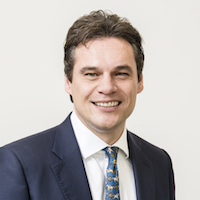This month:
Expert Investment Views:
Trade worries remain the dominant risk on the investment horizon.
Selective opportunities set to spring up in Emerging Markets debt, as definitions diverge.
Global growth heatmap reveals both hot and cool spots.
Investors urged to lose their fear of alternative investments.
Featuring this month’s experts:





Change is in the investment air as we look towards the final quarter of the year, with volatility forcing investors to shake off any last vestiges of complacency.
Here, leading wealth managers from our panel give their views on recent events and explain the key risks – and opportunities – investors should be thinking about this Autumn.
1. Watch the risks
Insights from:

As we approach the final quarter of the year, we encourage investors to maintain a strategic allocation to equities. Global economic growth remains supportive and corporate earnings growth is strong. And, although some equity markets are at all-time highs, in price terms, valuations are not high.
In this context, we continue to keep a close eye on a number of scenarios that could cloud the picture – namely, the potential for a sharper economic slowdown in China, faster monetary tightening by the US Federal Reserve, a spike in oil prices, and trade worries. By and large, the latter remains the dominant risk on the horizon for investors.
Global trade talks have not been a total disaster in recent weeks. Trade hostilities between the US and Europe are on hold, and NAFTA negotiations imply that US President Donald Trump will reach a compromise. Nonetheless, China remains a persistent source of tension. However, the current attitude towards China is rather less conciliatory.
![]()
A trade war, even between just the US and China, could unsettle markets and undermine global growth later this year.
A trade war, even between just the US and China, could unsettle markets and undermine global growth later this year. As we inch further towards the precipice of a fully-fledged global trade war with the potential to damage both nations’ economies, we are likely to see sweeping disruption to global supply chains.
Therefore, risk management will continue to be key to investor performance for this year. Investors should use the period of current relative market calm to identify and resolve vulnerabilities in their portfolios. Specifically, we propose five main strategies to do so. We advise investors to ensure that they diversify globally, reduce credit risks, consider downside protection, invest in assets exposed to secular drivers and look at adding exposure to alternative sources of return like hedge funds.

Geoffrey Yu
Head of UK investment office, UBS Wealth Management
2. Emerging markets: A problem of definition
Insights from:

We all love to group things. Grouping is helpful – it makes things easier to categorise and therefore think about. And, of course, there are few fields that better exemplify our preference for grouping things than finance. For the most part, finance gets it right, but there are a few obvious anomalies.
The collection of emerging markets is one of those anomalies, and it’s important to try and understand – particularly given the current events in Argentina and Turkey, as well as the global impact of a US-China trade war.
![]()
As a term, investors are at odds on what defines an ‘emerging’ market, and this problem of definition has led to a bizarre situation in which the composition of the group of ‘emerging markets’ changes depending on who you are talking to
As a term, investors are at odds on what defines an ‘emerging’ market, and this problem of definition has led to a bizarre situation in which the composition of the group of ‘emerging markets’ changes depending on who you are talking to. Even the world’s two largest index providers can’t agree – MSCI treats South Korea as an emerging market, and it has a weight of around 14% in their emerging market index. Conversely, the London Stock Exchange Group (the parent company of FTSE Russell) defines South Korea as ‘developed’.
In short, the term is just too broad. Should a domestic political issue in Turkey change your view on India? Or China? Or Mexico even? There may be tangential impacts, given the nature of globalisation, but at a high level, large scale ramifications are unlikely. But we have with a situation where, lots of countries have seen their stock markets and currencies punished, because of their classification.
As long as we believe that the global economic expansion is going to continue, there are likely to be some decent opportunities among emerging markets for those willing to look beyond the group-think and focus on the investment fundamentals.

Ben Kumar
Ben Kumar, Investment Manager at Seven Investment Management (7IM),
3. Emerging market debt sparking interest
Insights from:

Although the summer holiday period is characterised by lower volumes, it also tends to be characterised by more volatility. This August has been no different as we have seen certain emerging markets, particularly Turkey and Argentina, subject to extreme currency and bond weakness. The Italian bond market has been unsettled by rumours of a budget proposal for 2017 that would show a 2% or even 3% deficit to GDP, with 10-year yields rising from below 2.6% to above 3.2% at the worst. Meanwhile, the US equity market continues to substantially outperform other regional markets on the back of stronger economic growth and continued earnings upgrades.
As market participants return from their sun loungers, the question is whether these trends will continue. The global economy continues to grow, clearly led by the US, and this trend can easily extend for the rest of the year – which should provide some comfort for risk assets in general. Emerging markets (EM) tend to struggle when the US dollar is strong (on a trade-weighted basis), however if you are selective in EM debt there should be opportunities, given the rather indiscriminate spread-widening that we have seen.
![]()
Emerging markets (EM) tend to struggle when the US dollar is strong (on a trade-weighted basis), however if you are selective in EM debt there should be opportunities, given the rather indiscriminate spread-widening that we have seen.
Hard currency EM debt indices currently have wider spreads than US high yield indices despite their better credit quality – a phenomenon that is seldom witnessed. And although Italy will surely have a proper debt crisis at some time in the next decade, given its economic and demographic fundamentals, it is unlikely to be right now!

Caspar Rock
Chief Investment Officer at Cazenove Capital
4. Keeping an open mind is vital
Insights from:

As we entered this year, our view on the global economy was that while growth was strong and seemed likely to be very healthy in the first half of the year, this period was likely to be ‘as good as it gets’ for the global economy. Whilst we made this projection with a number of cowardly caveats (and it is fair to say that this view has been properly stress tested through the last eight months), so far it has been proven right.
What has been most interesting is the evaporation of last year’s en vogue economic phrase ‘globally synchronised expansion’ as we have started to see a growing divergence in fortunes around the world. The easiest way to sum up this split is that the US is doing well, Europe and Japan are doing ‘ok’ and the emerging market world, led by China, is slowing. The biggest question to answer is whether parts of the world can ‘march to the beat of their own drum’ for long or whether a convergence of economic direction is likely.
![]()
When we break down the overall picture we find parts of the world that are hotter and colder than others, as well as bits where the potential for overheating or cooling too much is high
When we break down the overall picture we find parts of the world that are hotter and colder than others, as well as bits where the potential for overheating or cooling too much is high. It is certainly a lot more complicated than it was last year and the future is uncertain.
We would expect the overall rate of the global economy to slow as we head towards next year, not least as in a globally connected world the reduced potency of China and the EM world will weigh to a degree upon the US and Europe. That being said, the balance of positives and negatives are finely balanced and keeping a very ‘open-mind’ is absolutely vital when one considers the interlinkage between the economic outlook and an investment strategy.

Thomas Becket
Chief Investment Officer, Psigma Investment Management
5. Our thoughts on risk management
Insights from:

Let’s talk about diversification. If you had held a portfolio of stocks, corporate bonds, real estate, and commodities in 2008, then how would you have done during the last financial crisis? Not very well it turns out – all of these investments lost about half their value, on average. How can this be, even though they are entirely different asset classes? Because they all have the same underlying risks, as historical evidence clearly shows.
So, what to do? Just hold on for the long run and hope for the best? After all, things have always gone up and this is also what 2008 has shown: by doing nothing we are now much better off. Yes, and fair enough, but having lost 50% means you have to make 100% just to get back to where you were. There must surely be something better we can do, so as to not lose half of our assets at the same time.
![]()
Trend-following strategies had a field day, government bonds went up and so did the US dollar, market neutral strategies didn’t care, private corporate lending continued (as the world just went on), and various event-driven or project-specific strategies were completely unaffected
And there is, because even during the bleakest of times, some strategies didn’t lose that much and some even made money. Trend-following strategies had a field day, government bonds went up and so did the US dollar, market neutral strategies didn’t care, private corporate lending continued (as the world just went on), and various event-driven or project-specific strategies were completely unaffected. So, it must be possible to structure our portfolio in a way that avoids losing on everything.
How? Simple, forget about the definition of asset classes, lose your fear of so-called alternatives, and diversify according to risk. And, for heaven’s sake, please forget about trying to time the next crises or relying on active management to save the day. You cannot predict which strategies will do well, just like you cannot predict the future. The objective is to be exposed to different underlying drivers of risk and to pay as little as possible. The rest kind of takes care of itself.

Christian Armbruester
Chief Investment Officer at Blu Family Office
Important information
The investment strategy explanations contained in this piece are for informational purposes only, represent the views of individual institutions, and are not intended in any way as financial or investment advice.
Any comment on specific securities should not be interpreted as investment research or advice, solicitation or recommendations to buy or sell a particular security.
We always advise consultation with a professional before making any investment decisions.
Always remember that investing involves risk and the value of investments may fall as well as rise. Past performance should not be seen as a guarantee of future returns.

